This is a delicious medieval arab recipe from the excellent book: "Medieval Arab cookery" by Maxime Rodinson.
Madira is a main-course meat dish comprising mainly of cooked meat with leeks and spices and with yoghurt mixed in.
Basic recipe (quick overview - step-by-step is below)
- Cut the meat into middling pieces with the tail, if chickens are used quarter them
- Put into saucepan with a little salt, cover with water and boil, removing the scum.
- When almost boiled, take large onions and Nabatean leeks (small leeks). peel, cut off the tails, wash in salt and water, dry and put into the pot.
- Add dry coriander, cumin mastic and cinnamon, ground fine.
- When cooked, and the juices are dried up, so that only the oil remains, ladle out into a large bowl.
- Now take persian milk (curdled milk) as required, and put into the saucepan added salted lemon and fresh mint.
- Leave to boil then take off the fire stirring.
- When the boiling has subsided, put back the meat and herbs.
- Cover the saucepan, wipe it's sides, and leave to settle over the fire, then remove.
Step-by-step
1. Cut the meat into middling pieces with the tail, if chickens are used quarter them
I just bought chicken thighs... already "quartered"
2. Put into saucepan with a little salt...
...cover with water and boil, removing the scum.
Here I've just covered the meat with water and am putting it on to boil. i didn't bother removing the scum... it didn't seem to be particularly scummy and didn't affect the flavour at all.
3. When almost boiled, take large onions and Nabatean leeks (small leeks)...
From reading elsewhere in the book, nabtean leeks were small ones... luckily my grocer happened to have baby leeks, which were perfect. In years since I've grown my own and I'm an expert in growing non-full-sized leeks now ;) (AKA I can't get them to grow beyond a certain size before they bolt) so that's just perfect!
...peel, cut off the tails, wash in salt and water, dry and put into the pot.
The recipe calls for them just to be tailed and put into the pot. It doesn't say anything about chopping them smallers... so I chose to put them in whole because I thought that'd be cool.
It was cool while cooking, and looked interesting on the plate, but it was annoying while eating as they come out in huge big long fibrous mats. Next time I'll chop them at least in half/thirds so they're less clumpy.
4. Add dry coriander, cumin, mastic, and cinnamon, ground fine.
I took "dry coriander" to mean "seed not leaf", and bought ground spices from my favourite spice-shop.
I like Herbies spices, BTW - they're really good flavours and have very good plastic bags made for long-term storage. They also have a wide range of "interesting" spices like mastic. I've always been able to find the odd medieval spices there... cubebs, grains of paradise etc... all off-the-shelf. and it's a lovely little shop to visit.
PS - totally not affiliated I just think they're awesome.
The recipe doesn't have amounts, so I'm guessing based on my own past experimentation with similar recipes. This is how much i used of each.
I've never used mastic before and had to guess how much to use. I went and looked at other recipes and from guesstimations figured that a half a teaspoon would do.
The recipe calls for grinding, but only the mastic needed grinding this time around - the rest I had pre-ground spices for ease of convenience. Pre-ground spices don't last as long, of course.
5. When cooked, and the juices are dried up, so that only the oil remains, ladle out into a large bowl.
cooking cooking cooking - progress photos... you can imagine the montage-muzak yourself.
And finally it looks enough like the juices have dried up for me to ladle the stuff out into a bowl...
6. Now take persian milk (curdled milk) as required, and put into the saucepan added salted lemon and fresh mint.
Here I've chopped up the fresh mint and am about to prepare the salted lemon.
Persian milk is basically runny yoghurt. I've got potted-yoghurt here - fairly stiff, so I add a little milk later to make it runny. Plus I roughly chopped the mint and lemon.
All plopped into the pot together
And this is the consistency once it's all mixed in.
7. Leave to boil then take off the fire stirring.
So here I'm mixing the yoghurt and mint together and bringing it up to temperature again.
8. When the boiling has subsided, put back the meat and herbs.
So now I add back the meat and "herbs" to the pot and basically mix it all in together.
9. Cover the saucepan, wipe it's sides, and leave to settle over the fire, then remove.
Here it is all done, and served with cous-cous to which I've added barberries. Nom.

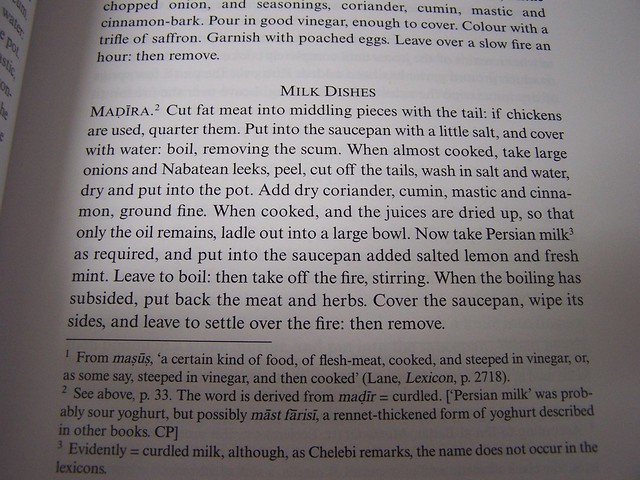
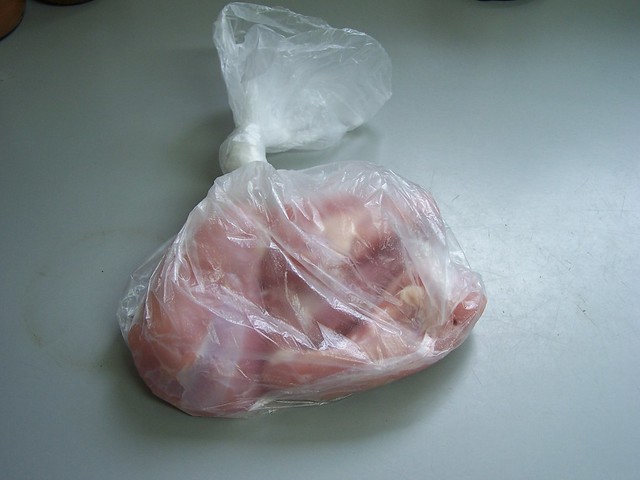
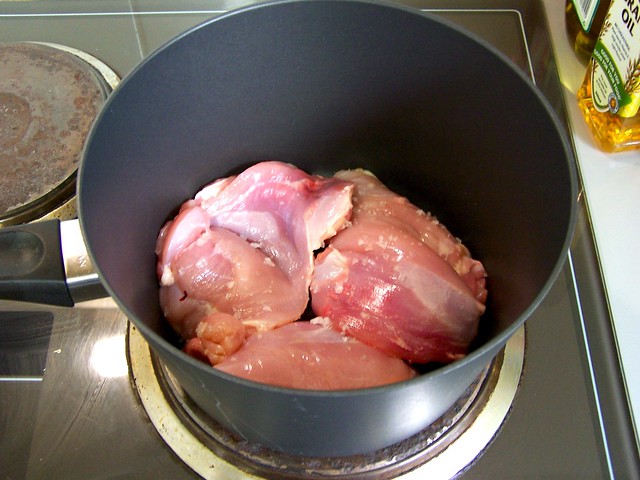
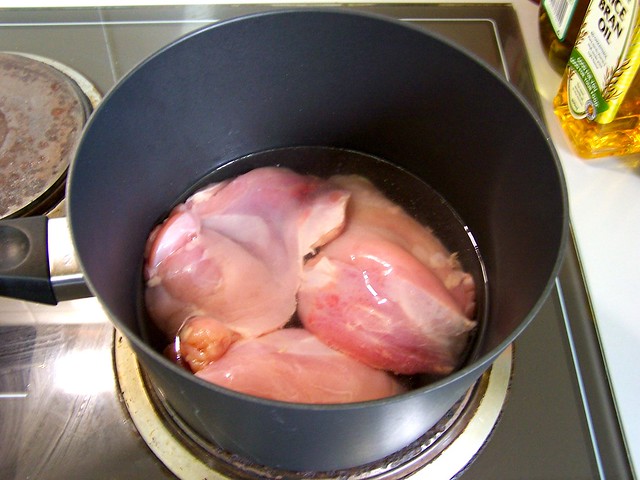







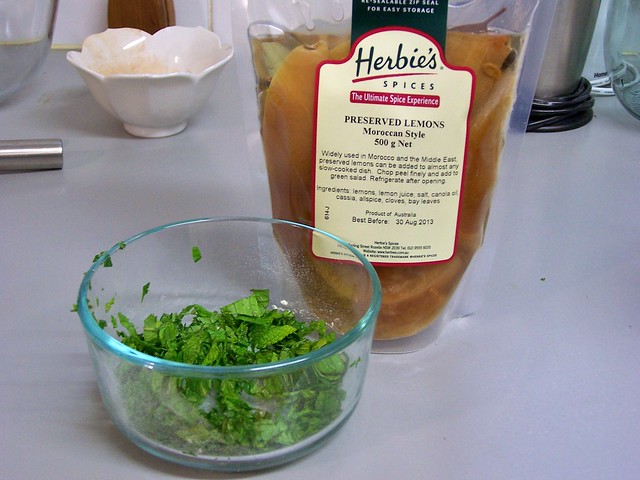


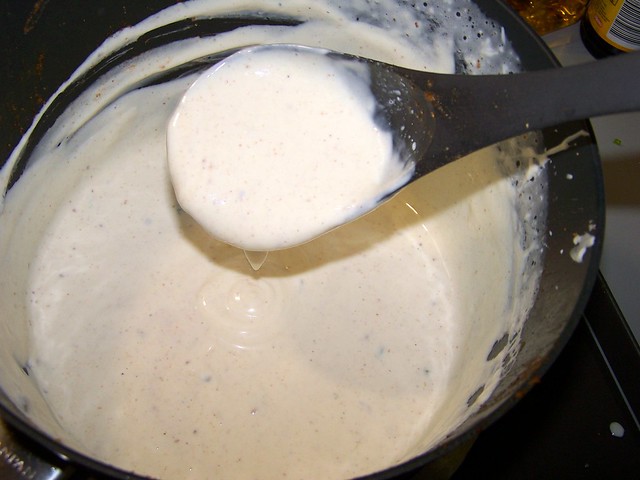
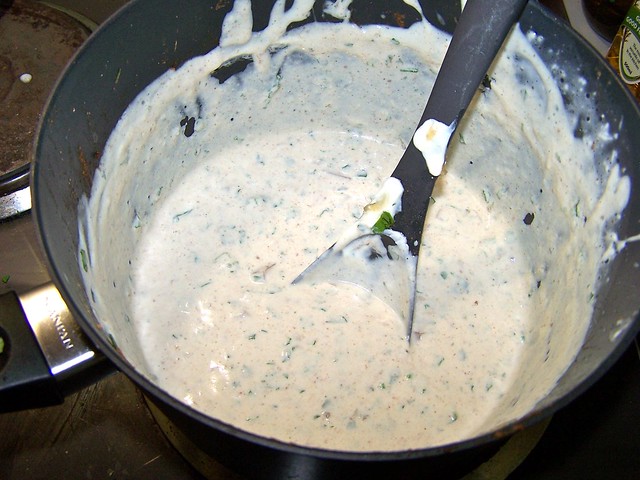

No comments:
Post a Comment